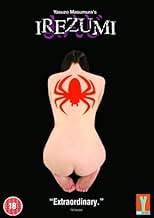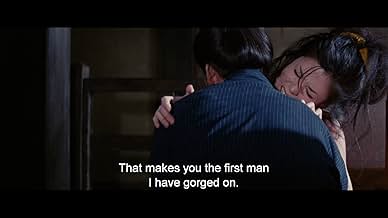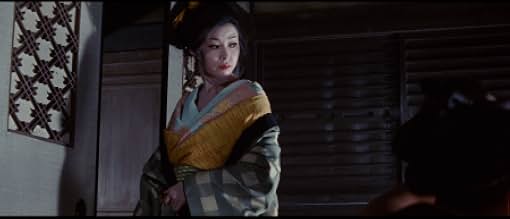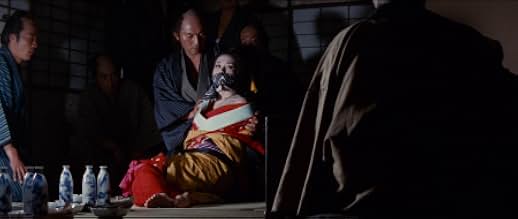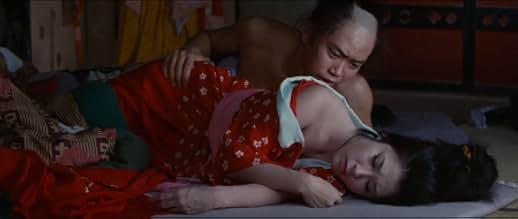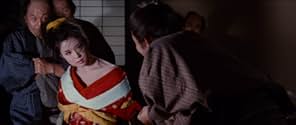NOTE IMDb
7,1/10
1,5 k
MA NOTE
Une femme séduisante est enlevée et forcée de se prostituer. Après s'être fait tatouer une araignée dans le dos, elle devient avide de vengeance et laisse plusieurs hommes sur son chemin.Une femme séduisante est enlevée et forcée de se prostituer. Après s'être fait tatouer une araignée dans le dos, elle devient avide de vengeance et laisse plusieurs hommes sur son chemin.Une femme séduisante est enlevée et forcée de se prostituer. Après s'être fait tatouer une araignée dans le dos, elle devient avide de vengeance et laisse plusieurs hommes sur son chemin.
- Réalisation
- Scénario
- Casting principal
Avis à la une
"Irezumi" (which means "tattoo" in Japanese) is an erotic costume film from one of the bad boys of '60s Japanese cinema. Director Masumura used a full palette of primary colors (with very vivid reds) to tell us about the story of Otsuya, a beautiful young woman from a middle-class merchant family who is abducted into geisha work, and who catches one day the eye of Seikichi, a tattoo master who marks her back with a huge, monstrous spider. From that moment on, Otsuya will take her revenge with every man who shared her bed.
If you have an appetite for perverse stories, try this one. To play Otsuya, Masumura used beautiful actress Ayako Wakao, best remembered in the West for her part in Mizoguchi's "Street of Shame" (1956), where she was Yasumi, the cold-hearted and money-greedy prostitute. She inspired Masumura throughout the '60s, and "Irezumi" is one of their best collaborations. Adapted to the screen by Kaneto Shindo (the internationally acclaimed director of "The Naked Island" and "Onibaba"), the script goes far beyond Junichiro Tanizaki's original short story. In Tanizaki's work, a sadistic tattoo artist searches for his ultimate canvas, a beautiful girl, to create his masterpiece. The girl is innocent until the tattooer finishes "pouring his soul" into her tattoo, which represents a huge tarantula (it is better to know that "tarantula" in Japanese is "jorôgumo" and "jorô" stands for "prostitute", as both attract men to suck their blood). She becomes thus the "femme fatale" of his dreams. In "Irezumi", we never know if Otsuya is evil by nature or if the tattoo is the cause of her misconduct and bad manners, and that's the most fascinating aspect of the film. As it is a "pinku eiga" of the '60s, don't expect graphic sexual scenes but highly suggestive shots (which are more than enough) and enjoy this shameless film. As for me, I still haven't decided yet whether it is a misogynous film or its complete opposite. And what about the spider? It's a... uh, very special piece of art.
If you have an appetite for perverse stories, try this one. To play Otsuya, Masumura used beautiful actress Ayako Wakao, best remembered in the West for her part in Mizoguchi's "Street of Shame" (1956), where she was Yasumi, the cold-hearted and money-greedy prostitute. She inspired Masumura throughout the '60s, and "Irezumi" is one of their best collaborations. Adapted to the screen by Kaneto Shindo (the internationally acclaimed director of "The Naked Island" and "Onibaba"), the script goes far beyond Junichiro Tanizaki's original short story. In Tanizaki's work, a sadistic tattoo artist searches for his ultimate canvas, a beautiful girl, to create his masterpiece. The girl is innocent until the tattooer finishes "pouring his soul" into her tattoo, which represents a huge tarantula (it is better to know that "tarantula" in Japanese is "jorôgumo" and "jorô" stands for "prostitute", as both attract men to suck their blood). She becomes thus the "femme fatale" of his dreams. In "Irezumi", we never know if Otsuya is evil by nature or if the tattoo is the cause of her misconduct and bad manners, and that's the most fascinating aspect of the film. As it is a "pinku eiga" of the '60s, don't expect graphic sexual scenes but highly suggestive shots (which are more than enough) and enjoy this shameless film. As for me, I still haven't decided yet whether it is a misogynous film or its complete opposite. And what about the spider? It's a... uh, very special piece of art.
A woman is kidnapped and drugged, then covered in a huge spider tattoo that may or may not have taken over her soul and turned her into a killer. She gets revenge on those that wronged her by becoming a geisha and causing their deaths.
A slow moving revenge movie centred around a geisha using her charms to manipulate men and killing them off. It's not really that much of a horror movie as the supernatural side isn't played up, even though it's hinted at. It's more of a samurai movie that happens to focus on the geisha and brief outbursts of violence that take the lives of others. It's interesting but not an amazing movie or anything.
A slow moving revenge movie centred around a geisha using her charms to manipulate men and killing them off. It's not really that much of a horror movie as the supernatural side isn't played up, even though it's hinted at. It's more of a samurai movie that happens to focus on the geisha and brief outbursts of violence that take the lives of others. It's interesting but not an amazing movie or anything.
Wonderful film based on a novel by Juinichiro Tanizaki, directed by one of the bad boys of 60's Japanese cinema, Yasuzo Masumura and starred by a brilliant and beautiful Ayako Wakao, who plays Otsuya, a beautiful young woman from a middle-class merchant family who is abducted into geisha work, and who catches one day the eye of Seikichi, a tattoo master who marks her back with a huge, monstrous spider. From that moment on, Otsuya will take her revenge with every man who shared her bed..
A very perverse story of revenge full of elegant erotism, not showing graphic nude or sex scenes but showing highly suggestive shots (which are more than enough) and made in a very poetical way, I've always been a big fan of how Japanese filmmakers were able to mix entertainment with art.
The film is also a reflect of how obsessive and toxic relationships always lead to a tragic ending and is up to the spectator to decide if Ayako Wakao's character is a victim of circumstances or responsible of it or maybe the spider on her back is the cause of her misconduct and bad manners....
A PIECE OF ART
A very perverse story of revenge full of elegant erotism, not showing graphic nude or sex scenes but showing highly suggestive shots (which are more than enough) and made in a very poetical way, I've always been a big fan of how Japanese filmmakers were able to mix entertainment with art.
The film is also a reflect of how obsessive and toxic relationships always lead to a tragic ending and is up to the spectator to decide if Ayako Wakao's character is a victim of circumstances or responsible of it or maybe the spider on her back is the cause of her misconduct and bad manners....
A PIECE OF ART
This film begins with an incredibly beautiful young woman by the name of "Otsuya" (Ayako Wakao) trying to convince a young man named "Shinsuke" (Akio Hasegawa) to quit his job working for her father so that the two of them can elope together and eventually get married. Although Shinsuke has grave concerns about leaving a good job and a boss who has been quite generous with him, he is easily seduced by Otsuya's charms and goes along with her in spite of it all. Having also stolen some money from her father, Otsuya and Shinsuke stay at an inn run by a man named "Kenji" (Fujio Suga) who is a business associate of the family. What neither of them know, however, is that Kenji has a hidden motive for allowing her stay to at the inn which soon comes to fruition when she is kidnapped and sold to a brothel in another city. But what Kenji doesn't quite fathom is that Otsuya is much more devious and resilient than anybody could ever conceive and that she is now determined to have her revenge on everybody involved with her abduction. Now rather than reveal any more I will just say that this was an extremely good film which was not only artistic in one sense but also had the advantage of featuring an incredibly talented actress like Ayako Wakao who dominated every scene she was in with her beauty and charm. And although there is quite a bit of sexual eroticism inherent within the plot the director (Yasuzo Masumura) uses a subtle technique which both stimulates the imagination and enhances the imagery. That being said, I thought that this was an excellent film and I have rated it accordingly.
A wonderful short movie with beautiful colors and characters acting like they are in Japanese Play, it works so well.
Female main character really sells the sexy but also dangerous kind of woman, that you can never really tell what she is really thinking.
Does she loves you, does she just use you? What is she really on about, she is a spider even before tattoo.
And the sad male mean character that truly displays what a slipper hero is, an goes way to for in this doom relationship.
It feels like watching and old Japanese tale that has been showed in the theater many many times.
It has a good length, but I think the sand of time made it so I didn't enjoy the movie as much if if I watched it when it came out. It's the sad fate of movies that have been built on so much.
Female main character really sells the sexy but also dangerous kind of woman, that you can never really tell what she is really thinking.
Does she loves you, does she just use you? What is she really on about, she is a spider even before tattoo.
And the sad male mean character that truly displays what a slipper hero is, an goes way to for in this doom relationship.
It feels like watching and old Japanese tale that has been showed in the theater many many times.
It has a good length, but I think the sand of time made it so I didn't enjoy the movie as much if if I watched it when it came out. It's the sad fate of movies that have been built on so much.
Meilleurs choix
Connectez-vous pour évaluer et suivre la liste de favoris afin de recevoir des recommandations personnalisées
- How long is Irezumi?Alimenté par Alexa
Détails
- Durée1 heure 26 minutes
- Couleur
- Rapport de forme
- 2.35 : 1
Contribuer à cette page
Suggérer une modification ou ajouter du contenu manquant


